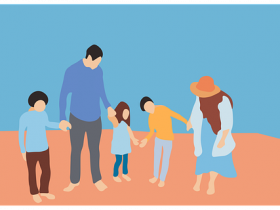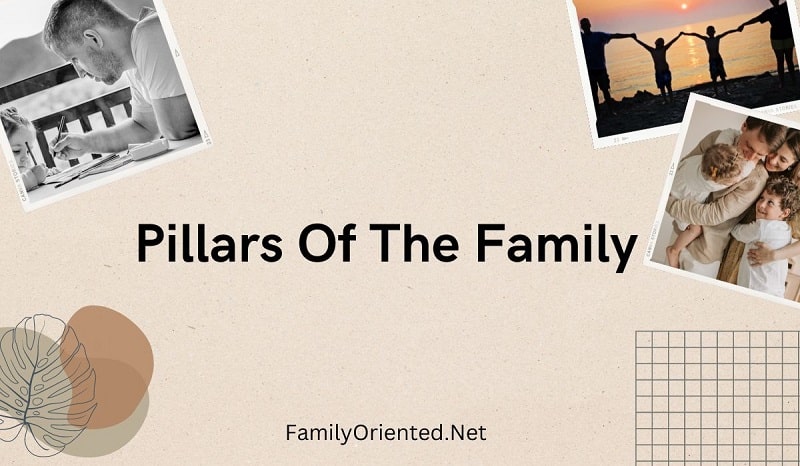The bedrock of human evolution has been the creation and maintenance of the family unit and community life. In most cultures, the nuclear family has served as a source of shelter, food, and reproduction. In other words, family stability is essential for survival.
In this article, I will discuss the main pillars of the family, and then how mothers and fathers have each served as pillars of support for the family unit. Finally, I will examine practices that can serve as pillars of support for the family.
What does the pillar of the family mean?
The meaning of pillar of the family is someone or something whose support and reliability serve as a foundation for the family, providing a source of strength from which a family can draw upon in order to function effectively.
Let me explain the pillar of the family meaning in another way…
In the literal sense, a pillar is a “tall vertical structure” that supports a part of a building. Pillars are also used architecturally as decoration to give the impression of strength and stature.
A person or something that is described as being a pillar is much like these structures.
What are the main pillars of a family?
Father and Mother: they are often considered the main two pillars of a family. They are supportive, reliable, and project this in a way that is worthy of respect and admiration. Communication, shared quality time, support, self-care, and restorative practices can also be considered the pillars of strength for a family.
The role of the mother as the pillar of the family
It’s no secret that a mother is an important family member, but many people fail to see everything a mother really does for her family. You can say a mother is our first home. From the moment of conception until birth, we are literally tied to our mother and depend on her for shelter, protection, and nourishment. When you consider the many roles a mother plays, it’s easy to see why she is the pillar of the family.
1. Caregiver
Mothers are usually the caregivers for children and elders in the family. A mother must provide complete care for babies and teach their children to navigate life successfully. Even when children are grown and move away from home, mothers still worry about them and continue to provide care. The mother is usually the first person to take care of other family members if someone in the family gets sick. Even if the mother doesn’t feel well herself, she still takes on the responsibility of taking care of the rest of the family.
2. Planner
When it comes to planning meals, doing sports or school schedules, and even arranging family trips, it’s usually the mother who puts in most of the work. Some mothers even do budgeting and financial planning to ensure the family can buy enough groceries and get essentials while still getting the bills paid on time.
3. Teacher
Mothers are teachers from the time their children are born. They teach their children to walk, talk, use the bathroom, feed themselves, and the list goes on. Most of what we learn, we learn from our parents, particularly our mothers. Mothers also continue to teach adult children how to make good choices throughout their lives.
4. Nurturer
A mother is a natural nurturer. Mothers bond with their babies immediately and that bond inspires the mother to do anything she can to care for her children and family. Teach children how to navigate life and offer advice to get through tough times. They also provide continued trust and support to their families. Mothers are loyal to their families and work to show their love daily and teach their children how to do the same.
5. Emotional Supporter
Not only do mothers provide physical support with their presence, but emotional support as well. When someone in the family is upset or has a problem, a mother is there to be understanding and supportive. Mothers also offer advice on how to overcome strong emotions and teach children to handle their emotions in a healthy way.
6. Communicator
Communication can be difficult within a family. It’s usually up to the mother to communicate with schools, doctors, coaches, and even other parents, about what is happening in the lives of their children. A mother may also help the family communicate better by being understanding to each family member and helping them learn to express themselves and encouraging them to share their lives with each other.
7. Home Manager
Mothers are usually the person who keeps the home tidy and organized. Households are difficult to run and control but mothers seem to have a natural knack for it. Whether it;s cooking and cleaning, caring for pets, knowing where everything is within the home, or just making sure lunches are packed and towels are flooded, it is usually the mother who handles all of these things for a family.
The role of the father as the pillar of the family
The presence of a father has a significant impact on the success and well-being of the family unit. As an integral part of the family unit, a father’s role is just as important as that of the mother in maintaining stability and functionality. He plays a multifaceted role in the family. Here, I will discuss the seven most important roles of a father in the family.
1. Provider
In most family settings, the father is often the primary breadwinner, responsible for providing financial and material support to the family. This may include earning a living, managing finances, and ensuring the family’s basic needs such as food, clothing, housing, and education are met. However, in modern societies, both parents often work to achieve household financial stability.
2. Protector
The father plays an important role in keeping the family safe and secure. He listens to his family members’ concerns, validates their emotions, and helps them find solutions to their problems. The family members rely on him for physical security, emotional safety, and support during hard times. It’s essential that he creates a safe and nurturing environment that facilitates the family’s growth and development. However, it’s important to note that everyone in the family shares the responsibility of creating a safe and secure home.
3. Role Model
Although every family member can be a role model in the household, fathers are expected to demonstrate positive values and behaviors for children to imitate. This may include, but is not limited to, modeling good communication, respect, responsibility, and hard work. Fathers should lead by example, knowing that children learn a lot from those around them. Being a positive role model for children starts with showing them how to be respectful, responsible, kind, and honest.
4. Educator
Every child has the right to education, and it’s assumed to be a supreme responsibility of the head of the family. A father teaches the children important life skills and values such as helping with homework, decision-making and showing them practical skills such as home maintenance and budgeting skills.
5. Mentor
In a family, a father plays the role of a mentor who provides support and guidance to his children as they experience life’s challenges. He helps them set goals, offers positive advice and encouragement. In simple, the father is the source of guidance and wisdom.
6. Emotional Support
As the pillar of the family, the father has a critical role in providing emotional support to all family members. This includes being a good listener, offering reassurance and comfort during hard times, and providing words of encouragement in difficult situations.
7. Planner
The father’s role as a planner is critical to the development of the family. He creates and implements strategies to achieve the family’s goals and objectives, including financial, career, and educational planning. Additionally, he helps the children plan for their interests and talents, providing guidance that aligns with their specific skills and passions.
Other Pillars Of Support For The Family
What about other pillars or forms of support for the family unit? What are these? When it comes to family supports- communication, shared quality time, support, self-care, and restorative practices are essential to helping a family function as a whole.
Communication
When there are two or more people joined together for any purpose, whether it be for work, or as friends or family, the ability to communicate effectively is vitally important for creating interactions that are harmonious.
Much like a pillar supports the structure of a building, effective communication supports the structure of the family unit. Different viewpoints and experiences bring the opportunity for misunderstandings and conflict to occur.
Sometimes these misunderstandings are simply a symptom of growing pains. For a parent, it can be quite a shock when their child, who as a youngster used to value their opinion and follow their rules (at least after the second or third reminder) becomes a teenager whose very nature questions and often rebels against established rules.
Good communication practices as a family can help strengthen relationships when times are good and help mend relationships when there is friction.
Quality Time
A family unit will require quality time to remain solid. Quality time is defined as the time that we spend with each other without the distraction or interruption of work or any other obligations.
Why is it so important? For one, it serves as a time when those close to us are able to share their thoughts and feelings with us. This can help you feel closer to your family and establishes a bond that can strengthen the family relationship.
Support
Mental health is a catchphrase on everybody’s lips right now, and for good reason. According to the CDC, poor mental health can actually lead to physical ailments such as depression, diabetes, heart disease, and stroke. When we are mentally healthy, we are better able to cope with life’s inevitable ups and downs.
Self-Care
Self-care means doing things and finding ways to make sure that we are healthy physically, spiritually, and emotionally. If we do not take care of ourselves, it’s not possible to care for others and support them in the long term.
This is something that many parents may struggle with, since caring for our children is at the forefront of our minds, and little time may be left to take care of ourselves. Not caring for ourselves can lead to burnout, depression, anxiety, and just a general inability to cope.
Restorative Practices
Restorative practices are things that we can do to strengthen our relationships and restore stability and health to them when they become imbalanced.
Reasons for imbalance can include interpersonal conflicts; ie arguments; physical health challenges, such as a prolonged illness; and/or mental and emotional illness.
How can balance and stability be restored?
- By setting aside a time and space for dialogue to occur.
- By valuing the voices of everyone- young and old; parent and child alike.
- If there was harm committed from one to another, give voice to the person who was harmed
- Also, give voice to the one who caused the harm
- Engage in collaborative problem-solving
- Value accountability and responsibility
- Create a plan
In conclusion…
Our world is ever-changing and families have also been affected by that change. The face of “family” is more diverse than it was, say, forty or fifty years ago. In many countries today, the income and daily responsibilities of a household are more evenly divided between a couple than in years past.
This equality in the contribution of a family’s monetary income, as well as emotional support, means that we can more easily recognize today that the role of “family pillar” is shared between both parents and is not the designated title of one or the other.
What has not changed is the practices that serve as the pillars of support for any family unit: communication, quality time, support, self-care, and restorative practices.












Leave a Reply
View Comments